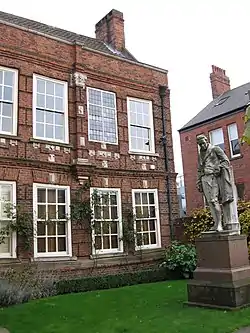Wilberforce House
Wilberforce House is a British historic house museum, part of the Museums Quarter of Kingston-upon-Hull. It is the birthplace of social reformer William Wilberforce (1759–1833), who used his time as a member of Parliament to work for the abolition of slavery throughout the British Empire. Like the nearby Blaydes House and Maister House, also on the High Street, the Grade I listed building[1] was formerly a merchant's house with access to quayside on the River Hull.[2]

The house is now a museum showcasing the life and work of one of Hull's most famous sons. The museum re-opened on 25 March 2007, after a two-year £1.6 million redevelopment, in time for the 200th anniversary of Wilberforce's Act of Parliament abolishing the slave trade in the British Empire.[3]
The front garden, named after Nelson Mandela,[4] contains a statue of Wilberforce which underwent a £10,000 restoration in 2011.[5] The statue was designated a Grade II* in 1994 and is now recorded in the National Heritage List for England, maintained by Historic England.[6] Adjoining the site is Oriel Chambers, the home of the University of Hull's Wilberforce Institute for the Study of Slavery and Emancipation which conducts research into historic and contemporary forms of slavery.[7]
The house also exhibits the East Yorkshire regimental collection.[8]
The house was forced to close in 2020 because of the COVID-19 pandemic, taking the opportunity to refresh its offer and undertake vital repairs. The building reopened to the public in May 2023.[9]
References
- Historic England. "Wilberforce House Museum and Attached Garden Wall (1209831)". National Heritage List for England. Retrieved 14 August 2013.
- "Wilberforce House and Hull's High Street". Hull Museums. Retrieved 13 April 2022.
- "Grant boost for work on anti-slavery museum". Yorkshire Post. 7 October 2005. Retrieved 18 November 2019.
- Davies, Andrew John (1 August 1995). "site unseen Wilberforce House, Hull". The Independent. Independent Print Limited. Retrieved 12 July 2010.
- "William Wilberforce statue in £10,000 restoration". BBC News Online. BBC. 12 June 2011. Retrieved 13 June 2011.
- Historic England. "Statue of William Wilberforce in Garden of Wilberforce House (1197754)". National Heritage List for England. Retrieved 14 August 2013.
- "Wilberforce Institute for the study of Slavery and Emancipation". WISE. University of Hull. 25 February 2011. Retrieved 14 August 2013.
- "Wilberforce House Galleries". Hull City Council. Retrieved 18 November 2019.
- "Hull's Wilberforce museum reopens after three years". BBC News. 20 May 2023. Retrieved 20 May 2023.
External links
- Official site
- Historic England. "Details from listed building database (1209831)". National Heritage List for England.